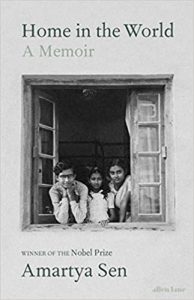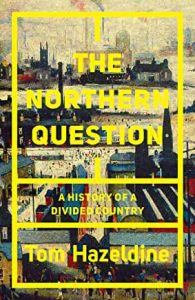I devoured Amartya Sen’s wonderful memoir, Home in the World. It covers his early years growing up in what is now Bangladesh, his schooling in Santiniketan (attending the school established by Rabindranath Tagore, to whom his family was close), college in Calcutta and then at Trinity College, Cambridge. The book ends at the early part of his academic career, in Cambridge and visiting posts in California and Massachussetts.
It’s a beautifully-written book and illuminates Sen’s intellectual formation. Clearly his family and Tagore played an enormously influential role, and so too the intellectual ferment in Calcutta in the early 1950s. Tagore’s school sounds remarkable in the freedoms it gave students and its emphasis on the role of reason, in unreasonable times. The political upheavals of the British withdrawal and partition play a relatively low key role in this story; but it has a lot to say criticising the religious and caste divisions in the sub-continent then and now, with many excursions into its history. Needless to say, the British don’t come out of this well.
The account intertwines the history of Bengal with Sen’s personal history and his intellectual development – particularly why he became interested in social choice theory at a time when few other economists were working on it, and his Cambridge colleagues warned him against pursuing it. There are interesting sections on Buddhism, and on Marx – in effect what each contributed to Sen’s reaction to the Arrow Impossibility Theorem (the possibility of agreement in restricted domains even if not about fundamental metaphysical views of the universe in the former case, and “a pioneering contribution to the understanding of the epistemic implications of observations” in the latter.)
Among all this, a personal history, with the most gripping episode being early treatment with radiation therapy for oral cancer as a new student in Calcutta. Thank goodness he survived. Anyway, highly recommended.
I also read this week The Northern Question: A History of a Divided Country by Tom Hazeldine. The divided country in this case is England, and the book traces modern divisions pretty much back to the Dark Ages (it is nevertheless quite short!). It essentially portrays the northern (and south western) regions as colonised by the capital, and repeatedly sacrificed for the sake of the financial sector. The book argues that it is not surprising the Conservatives should always favour southern financial interests: “The Conservatives are first and foremost creatures of the South,” (although they have won more Northern English seats more of the time than I had realised). Hazledine’s quarrel is with Labour Governments that tilted the same way, from Macdonald and Snowden, to Wilson, to Callaghan and Healey, to Blair and Brown. This is the main point of the book. It concludes, “[Labour] has routinely swallowed a definition of the national interest that puts sterling and the City ahead of manufacturing and the North.” Looking at the trajectory of sterling over time it is hard to believe many of our governments have really wanted a strong currency, but I’m easily persuaded that City interests have generally dominated. Or at least a Southern governing class perspective that sees all the rest of the country as uncouth provinces. Brexit may prove the exception – we will see. Not that damage to the City in this case will do anything to influence the North-South divide.
Then this weekend in the garden Kazuo Ishiguro’s very fine novel Klara and the Sun. More than any other novelist I can think of, he presents the world comprehensively through the perspective of one character – in this case, a humanoid AI. Very thought-provoking, and a page turner, finished it in a day.


